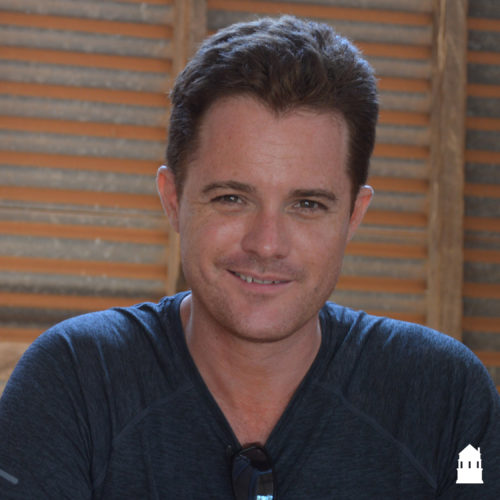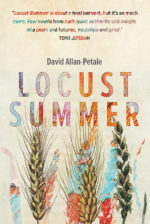Far away, so close: David Allan-Petale shares how travelling brought his new novel, Locust Summer, to life

Written while travelling the globe over five years, Locust Summer was shortlisted for the Australian/Vogel’s Literary Award (2017) and was developed through a fellowship at Varuna, the National Writers’ House. In this blog post, David Allan-Petale invites you along for the journey.
The heat, dust and distance of the West Australian Wheatbelt are characters in their own right in Locust Summer.
They are ever-present in the story of a young man returning to the family farm for its final harvest, battling to save what connections remain and create a future separate from the land.
Yet for most of the writing of the book, I was travelling outside Australia, thousands of miles and climate zones away from the places I was conjuring.
Memory helped – of the harvest I had worked in New South Wales years ago, and of the time spent in WA’s regions as a journalist rep orting on the land and its people.
I found that the stranger the place I was in, the more readily and more intensely my visions of the Wheatbelt came to me.
From the jungles of Peru to the rice paddies of Bali, that distance brought me closer. I discovered that travel gave the detachment I needed, so that dreams and feelings could take over from the cold truth of research and experience.

Indulging the writer
For nearly five years, my wife, Carmen, and I traipsed across the globe, working as freelancers to pay the way. And all that time I was writing Locust Summer.
I’d get up very early and write while the sun rose. That could be in the roofttop beer garden of a hotel in Cartagena, Colombia, where the light would silhouette the battlements of a Spanish colonial castle. Or the dark signature of Agung, the mountain revered in Bali, slowly forming for the new day.
I felt like Ernest Hemingway on safari, or Graham Greene on a jaunt. I even visited their work spaces – Hemingway’s apartment in Havana, and Greene’s balcony seat at the Hotel Continental in Saigon, where he wrote The Quiet American.
Being a massive word nerd, this became a very satisfying hobby, seeking out books written in the places we were visiting and then finding the waypoints.
The village of Massacre on the Caribbean island of Dominica is mentioned in Jean Rhys’s Wide Sargasso Sea, so of course I had to go. The Galápagos Islands in Patrick O’Brian’s The Far Side of the World. The Texan wilds of Cormac McCarthy’s The Border Trilogy.
A bit much, I know – but all of this literary roaming helped keep me motivated to work on the book, reminding me that the people I admired had done it too, and that I wasn’t just wasting my time being a lotus-eater.

Improvised expressive devices
The heavy-duty drafts of Locust Summer were scribbled in notebooks on bumpy midnight buses in Ecuador, tapped out on an ancient Dell laptop in Cuba, then typed on a fancy MacBook Air (that’s still going), which I bought for a pound of flesh in Colombia.
No office. No desk. No privacy.
Tray tables balanced across the armrests of Adirondack chairs at fancy resorts where you could get wi-fi for buying a cocktail. Kitchen tables in house-sits. Café tables. Library nooks. The sidelines of a soccer field in Ubud.
This lack of comfort and convenience was actually a lot of fun.
Finding a good spot to write became one of my consuming passions, and I was always on the lookout for somewhere interesting to work.
Perhaps the ultimate writing set up was actually going out to buy desks and chairs at a market in Saigon, lugging them through the streets and then going up our ancient apartment’s elevator, so we could set them up beside the dusty windows overlooking the shacks by the river.
Every desk was different. But the work was always the same – dive into the words, seek out the dust and heat that was so very far away.

Back to the start
The final drafts of Locust Summer were written in Australia while I was on an 18-month caravan trip with my wife and baby daughter.
When travel is in your blood, you can’t stop, I suppose. And when it’s joined with writing, heaven help you.
So I came full circle and finalised the story with my home soil underfoot, the stars wheeling above as I worked outside at night at my camp table with a hurricane lamp and a nip of whisky.
Having been away for so long, I was worried the country would feel starved compared to the imagined images I had created for Brockman’s Place where ‘the highway was the spine, the paddocks the ribs, and the tracks the veins.’
But as I typed ‘The End’ sitting on the beach in Kalbarri, it hit me hard – there is no capturing this place.
It’s endless. A wide-open road. All interpretations grasping for the ghosts it holds.

Locust Summer is available in all good bookstores and online.



